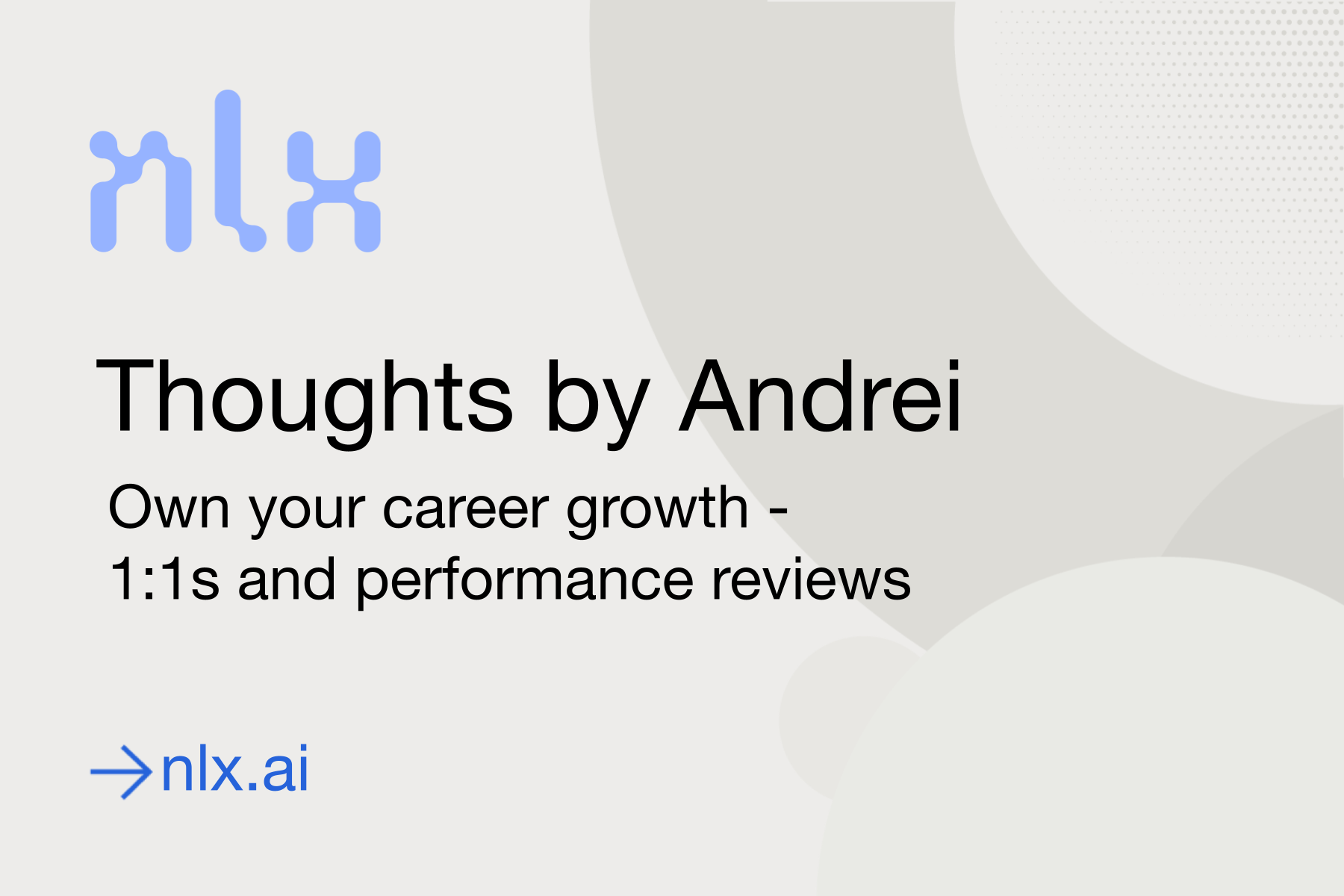
Own your career growth - 1:1s and performance reviews
I get it. Performance reviews evoke a lot of different emotions: fear, dread, hope, anxiety…
They are often thought of as a sort of company-mandated, check-the-box activity for managers and employees to sit down and discuss the work done and work coming up. They are an extra activity on top of the employees’ and managers' regular workload, taking up time, effort, and mental bandwidth.
But when done correctly, they can be incredibly helpful tools for growing and aligning the organization, team, and individuals. This simple communication tool can be used as an opportunity to both reflect on the past and plan for a brighter future. They can help identify areas of improvement or growth, build better morale and teamwork, surface – and resolve – any grievances, and increase job satisfaction and motivation.
To make sure our company derives the maximum benefit from performance reviews, while also reducing anxiety around the process, we’ve implemented a few mechanisms to ensure things go smoothly, and reduce any negative feelings around the meeting.
NLX conducts biannual performance reviews using a performance management software called PerformYard. The platform enables both the employee and the manager to record their thoughts on how the quarter or half-year went, where goals stand, and examples of how they embody company values and share feedback with each other. Using PerformYard helps generate reflection and create a system of record for both sides to react to during a 1:1 discussion. With the written review as a baseline, both parties have a better idea of how the conversation might flow, given what’s written, reducing potential anxiety around the conversation. This is also a great time to bring in conversations about career development.
To further diminish any anxiety, we follow the best practice that anything said in your performance review should not be a surprise. Your review should be a recap and summary of the conversations you’ve already been having over the course of a quarter or half a year and a look forward to what’s next.
To ensure there are no surprises, I typically recommend employees host 1:1s with their managers once a week or every other week. This regular communication can help develop a relationship while also creating the opportunity to discuss a few crucial aspects:
Share critical information and updates: Ensuring you and your manager are working off of the same information helps to align the individual and the team.
Celebrate the small wins: Everyone likes to hear good news! Don’t be afraid to share something that went well this week in your 1:1.
Bring challenges and ask for advice: You’re going to encounter challenges in your career - if one pops up, bring your manager, their career experience, and their company context into the conversation to help you solve that challenge!
The people who I’ve seen do this well throughout my career tend to follow a specific formula, one that works well for managers and executives alike…
- First, explain what the challenge is high-level, giving context where needed.
- Then, share the proposed approach to solving the problem. Or, if you’re truly out of ideas, say so and share the options you did consider and why you ruled them out.
- Ask for guidance on how to better approach the challenge - do they like your solution? Do they have a different approach they recommend?
- Finally, follow up with the result! During your next 1:1 or email, let the person know how their advice benefitted you in solving the challenge.
This is a simple framework I’ve observed over the years, but here’s why it’s important. There’s a circular communication happening that’s extremely helpful to the organization. A hurdle to an existing challenge is identified, potential solutions are sourced, then verified through a manager who attempts to help remove the hurdle. The hurdle is then removed, and success is shared. The manager knows that their efforts and feedback were helpful, making them even more likely to help next time a challenge arises. This strengthens teamwork, builds morale, and leads to strong team learning!
Check-In: Don’t be afraid to ask how you’re performing in your job. Getting feedback is critical to continue growing no matter what level. The person you ask might not have any feedback for you immediately, but at least getting them to think about it is a good start!
That said, it’s just as important for managers to ask for feedback on how they are doing. The 1:1 is a great place to ask for this feedback. Here are some great questions that I recommend:
- Where do you think I can be most helpful?
- Do you have any feedback for me on how I can be a better manager?
- What is the one thing you see me doing that gets in my own way?
- What’s the one thing I could change that would make a difference to you?
- What is the one thing you see me doing that is getting in my own way or the way of the company?
If you’re having regular 1:1 conversations that include some or all of these elements, by the time your performance review rolls around, it’s more of a recap of your successes and efforts at the company that advances you, rather than a nerve-wracking conversation. Performance reviews can be doors to begin discussing what you would like to learn, achieve, or build toward next!
I’ve also witnessed successful employees having these conversations not only with their direct manager but also with other leadership members too. This practice built a team of people who were personally invested in the individual, their growth, and the good work they were doing for the company. That small army turned out to be extremely beneficial when it came time to discuss promotions/raises.
Regardless of whether or not your organization has required 1:1s and performance reviews or if your manager sets them up, at the end of the day it's YOUR job to own YOUR growth at the company.
I learned this the hard way during my time at American Express. During my time there, I got a new manager and I thought that they were responsible for scheduling 1:1s and performance reviews. When those didn't happen with the cadence I expected, I got frustrated because I wanted to have these important conversations to continue to drive my career forward.
I made common excuses like, "My manager didn't schedule the performance review, so I guess I'm not having one", "Well my manager had to postpone/reschedule my 1:1, so I guess they don't see it as a priority", and "It's not my job to schedule these conversations."
I learned that making these excuses didn't get me any closer to having the 1:1 conversation I wanted to have, nor did it help advance my growth. When I started taking ownership of the 1:1s and performance reviews - putting them on my manager's calendar - I was able to have really productive conversations that pushed my career forward and helped me own my career growth.
At NLX, we practice a large amount of autonomy within the company, so I think it's important to continue that autonomy and enable employees to build this "own my growth" muscle, even in a fast-paced, hands-off environment. We place too much faith and pressure on organizations to regulate and implement these conversations, and they're too important not to have.
